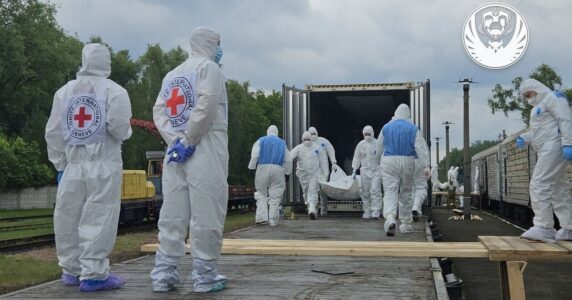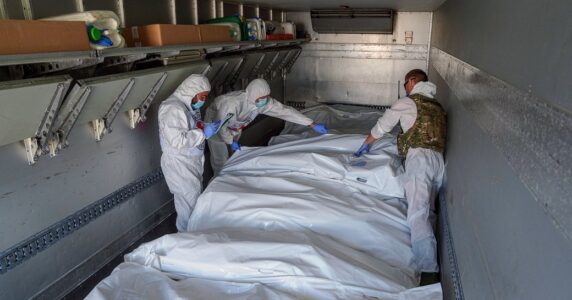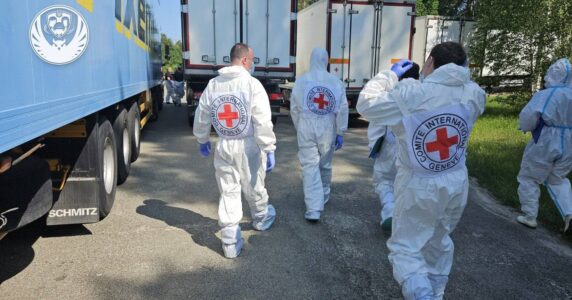Navigation and useful materials
Russia has been trying to discredit Ukraine’s cooperation with NATO for years, including by criticizing the Ukraine-U.S. Sea Breeze exercises. But this year, the scale of the information pressure campaign is unprecedented.
For the first time in decades, Russia said it had fired at a ship of a NATO member country participating in a naval exercise in response to a “provocation.” Though there is still no convincing evidence that the shelling did take place, the Kremlin and pro-Kremlin forces have already used verbal shelling as a reason to talk about “big war” and “regaining control” over Ukraine.
Traditionally, Kremlin speakers began warming up public opinion even before the exercises. They warned of “unintentional incidents” and intimidated with “an orgy of militarism,” a “secret transfer of US weapons to Ukraine,” and “World War III.”
In April 2021, Russian Security Council Secretary Nikolai Patrushev said that Ukraine could allegedly start hostilities in Crimea by “organizing provocations involving deaths of its servicemen with the US support.”
In early June, the Russian Defense Ministry called Sea Breeze-2021 exercises “a cover for the transfer of advanced weapons and ammunition from the U.S. to Donbas.” The same statement about the transfer of weapons to Donbas “under the guise” of exercises was repeated last Saturday by Maria Zakharova, the Russian Foreign Ministry spokeswoman. Zakharova also added: “Kyiv and NATO’s exercises provoke endless destabilization along the perimeter of the Russian border.”
Prior to the incident with the British warship Defender, on Wednesday morning, the Russian embassy in the United States on its Twitter page called on the United States and NATO to abandon joint Sea Breeze-2021 military exercises in the Black Sea, because they “increase the risk of unintentional incidents.”
All this is done in order to disrupt the exercises that have been held for several years in a row to prevent attempts to destabilize the entire region. Today, they increase Ukraine’s defense capabilities: not by a fictional “transfer of weapons”, but by a real acquisition of experience and coordinated interaction of the partners. They also demonstrate the inconsistency of Russia’s claims to economic activities in the region.
Disinformation preparation for its own attacks is a recognizable Russian style. Before each exacerbation, we can also trace blatant warnings about a certain pre-planned destabilization.
For example, in November 2018, Leonid Kalashnikov, chairman of the State Duma Committee on CIS Affairs, Eurasian Integration and Relations with Compatriots, actually announced three days in advance an attack of the Russian Navy and the Coast Guard on a Ukrainian naval ship in the Kerch Strait: “Perhaps it leads to that very provocation, as a result of which tomorrow — as in Salisbury, without everything, without any evidence — the Russians bombed a boat or shot down something else… And this cannot be ruled out, because Russia in this sense will behave and must behave resolutely.”
Until June 2021, the pro-Kremlin media promoted its usual narrative that NATO allegedly did not need Ukraine and that its chances of joining the Alliance were slim. But on June 9, Putin suddenly said that he had a different opinion on the matter: “Yes, I know. I see the comments of our observers; I see the reaction of our media, our politicians. Everyone would laugh a little, say that it’s empty talk, nothing will happen, and so on. I’m of a different opinion.”
After his words, the headlines of some Russian media began to frighten with war. “Ukraine-U.S. Sea Breeze exercises as a provocation of big war”, “We know consequences of Ukraine’s accession to NATO: big war”, “Putin makes it clear: if Ukraine joins NATO, there will be war” etc.
RIA FAN, the Federal News Agency, which is associated with businessman Yevgeny Prigozhin (known as “Putin’s cook”), laid out the Kremlin’s political position most openly: “Ukraine is part of Russia’s national interests. There will be no more false compromises, and, in fact, we close the historical discussion of Ukraine’s potential accession to NATO. This decision will be seen by Moscow as a casus belli (reason for a war — Ed.): Putin has made it clear that in this case, Ukraine will be “on the firing line.” The fact is that the deployment of NATO’s military infrastructure on the territory of Ukraine is absolutely unacceptable for the Russian Federation within its current borders. Russia proclaims itself the historical and sovereign center of the former Soviet Union. Whoever decides to take unfriendly steps towards Russians and Russia in this space will be viewed by Moscow as a legitimate target for appropriate sanctions and force.”
On June 23, the occupying country responded to the passage of the British warship Defender through internationally recognized Ukrainian waters off the coast of the seized Crimea with a flurry of loud statements and accusatory comments.
The Institute for International Political and Economic Strategies RUSSTRAT, headed by Elena Panina, a member of the State Duma’s Committee on International Affairs, called for “excluding the UK from NATO” because it allegedly could “provoke World War III.” “The UK, which is a member of NATO, and Ukraine, which is not, pull a trick on the North Atlantic Alliance in their personal interests,” the statement said. This is how Russian politicians try to divide the members of the Alliance.
And the first deputy chairman of the Federation Council Committee on International Affairs, Vladimir Dzhabarov, put all the blame for the “provocation” on Ukraine.
“If they think provocation can help them break into NATO, they are wrong. NATO countries do not need a never-ending problem. And Ukraine brings constant problems, conflicts, complications with it. Do NATO countries need to have such a partner?” Dzhabarov said to RBC.
These messages often contradict themselves and any logic: concurrently, Ukraine is “not needed” by NATO, is a key element in NATO’s confrontation with Russia, or “pushes” the Alliance to such a confrontation. But Russian propaganda uses all available means to impose the idea that Ukraine’s cooperation with NATO is allegedly detrimental, threatening with dire consequences up to World War III.
It is useful to turn to history here, for what now seems to be a natural state of affairs — that presumably Russia has always been at enmity with NATO — looked different not so long ago.
“Putin does not object to Russia joining NATO. Despite many Russians’ not-so-welcoming attitude toward NATO, the Kremlin seems to have realized that Russia has no reasonable alternative to establishing normal relations with the Alliance. Putin’s statement was received very positively in Brussels. NATO immediately expressed its readiness for a partnership with Moscow.” Sounds like science fiction, but this is a quote from the Russian press — the newspaper “Kommersant” for 2000.
In May 2002, at the Russia-NATO summit in Rome, Putin and leaders of 19 member countries of the Alliance signed a declaration “Russia-NATO Relations: A New Quality.” The Russia-NATO Council was established and it was decided that in the future the parties would act as united twenty instead of the former 19 + 1 formula.
The creation of the Russia-NATO Council was initiated by Italian Prime Minister Silvio Berlusconi, a close friend of Putin, as an intermediate step before Russia fully joined the North Atlantic Alliance. From then on, Russia’s representative had a seat at the common table along with other members.
On May 29, 2002, at the Russia-EU summit, Vladimir Putin stated: “The Cold War is buried.”
The first attempt to disrupt the Sea Breeze exercises in Crimea was made only four years later, in the summer of 2006. Successfully. With the support of Russian politicians and Russian propaganda.
Last year, at a scientific-practical conference on totalitarianism, Serhiy Sokolyuk, an associate professor at the Naval Forces Department of the National University of Defense of Ukraine, called those events a “rehearsal of hybrid warfare”.
Supporting the anti-NATO protests in Crimea with the participation of Russian State Duma deputies, the Russian media promoted not only the idea of NATO’s “hostile expansion,” but also the message that Crimea is “not exactly Ukraine.” In particular, the Russian Channel One сlaimed: “If Crimea is Ukraine, it is only due to an anecdotal misunderstanding.”
A proposal to annex the peninsula was made at the level of the State Duma of the Russian Federation. The State Duma unanimously voted in favor of a protocol order requesting information from the Russian government on measures to return Crimea to Russia under the Kuchuk-Kaynardzhiy Treaty of 1774 concluded between two non-existent states, the Russian and Ottoman empires.
The author of this document, deputy from the LDPR faction Nikolai Kuryanovych, stated: “We should not be afraid of aggravation of relations — put pressure on Kyiv both economically and politically, use our Russian diaspora. And my point of view is to do our best to divide Ukraine. […] In the near historical perspective, Ukraine will lose the status of an independent subject of international law. Because there has never been statehood in Ukraine. This is Russian land.”
Researcher Serhiy Sokolyuk drew attention to the absurdity of that situation. The Russia-NATO format included 19 joint working groups, which were active in 2006, while Ukraine had only 5 working groups with NATO. In many areas, Russia cooperated with NATO much more deeply than Ukraine. Apart from supporting anti-NATO protests in Crimea, Russia’s Channel One enthusiastically reported on the arrival of the US Navy’s FFG-49 frigate for a port visit to St. Petersburg.
According to Putin’s close aides, until about 2005, the Kremlin seriously hoped for an invitation to NATO. And they discussed under what circumstances to accept this invitation. Putin was convinced that Russia should not “stand in line” — NATO had to ask Russia to join it.
The defeat of the candidate they supported in the 2004 presidential election in Ukraine was terribly painful for the Kremlin, because they could not understand its reasons, explaining everything by the trick of the West.
Since then, the Kremlin responded to Ukraine’s Euro-Atlantic aspirations as a provocation and a crime against Russia. And not only Ukraine’s aspirations. Russia aggressively “protects” all former “brothers” from attempts to get away from the clutches of Russia towards the West.
In 2007, Estonia was subjected to Russia-backed mass riots accompanied by shoplifting and destruction of property. Its embassy in Moscow was blocked and stoned. A coordinated hacker attack disrupted the websites of the Estonian parliament, ministries, banking institutions and the media for a while. All this happened after the relocation of the Soviet war memorial in Tallinn, which the Kremlin declared a “revision of the results of World War II.”
The Kremlin responded to the possible prospect of Georgia’s accession to NATO with an attack on the country in August 2008, official recognition of Abkhazia and South Ossetia, and an anti-Georgian campaign inside Russia, including targeted detentions and deportations of Georgians.
According to the Коmmersant, at a closed-door meeting of the Russia-NATO Council in the spring of 2008, Putin hinted that Ukraine could cease to exist as a single state if it joined NATO.
“When it came to Ukraine, Putin was furious. Addressing Bush, he said: “You understand, George, that Ukraine is not even a state!” And here he hinted very clearly that if Ukraine is admitted to NATO, it will simply cease to exist. That is, in fact, he threatened that Russia could begin the annexation of Crimea and Eastern Ukraine,” the newspaper reported.
From then on, Russian propaganda actively promoted a number of myths, partly perceived as the truth by politicians and analysts in the West. These myths were to justify Russia’s aggressive policy toward its neighbors, who sought democracy and independence.
In May this year, the Royal Institute of International Affairs (better known as Chatham House) deconstructed 16 “myths and misconceptions”. In particular, these are the myths of the “triune people”, “the sphere of privileged interests” and “the insidious expansion of NATO.”
Putin reiterated the message about “insidious NATO expansion” in his article for the German newspaper Die Zeit, published on June 22 this year. It is said that when the Soviet Union agreed to German reunification in 1990, its leadership was given a [verbal] promise that “the borders of the bloc will not approach you.” But later they deceived. “Ask Gorbachev,” Putin said earlier in an interview to NBC. “They just didn’t care about our interests,” he said in an interview to Russia 24.
According to Chatham House, no such promise could be made. The issue was not even under discussion at NATO at the time, since the Warsaw Pact and the USSR were both still in existence. Even if the Warsaw Pact’s days were clearly numbered, there was no expectation in Western capitals in the autumn of 1990 that the USSR would collapse a year later.
The disappearance of the USSR created an entirely different geopolitical reality that quickly exposed differences between Western countries and Russia on how to manage European security and, in particular, on the role of NATO.
Chatham House stresses in its report that the NATO enlargement myth also contains an important distortion of fact: while the Russian Federation became the de facto legal successor to the USSR after the latter’s collapse, Russia existed in different borders and its security interests were not synonymous with those of the USSR.
Indeed, Russian leaders at the time did not want the West to regard the new Russia as a truncated form of the USSR, but rather as a country that had regained its sovereignty and was returning to its European roots after the tragedy of Bolshevism. In addition, the USSR signed the Charter of Paris in November 1990 with the commitment to “fully recognize the freedom of States to choose their own security arrangements.” The NATO–Russia Founding Act, signed in 1997, similarly pledged respect for the “inherent right” of all states “to choose the means to ensure their own security”.
The idea of Russia needing a “sphere of privileged interests” in neighboring states deprives those states of agency and ignores their own interests. Such thinking is to deny smaller states or entire regions the sovereign right to self-determination. It is a manifestation of a neocolonialist view of the world. The use of this concept has real devastating consequences, as evidenced by Russia’s aggression against Ukraine.
Russia continues to stubbornly deny Ukraine its subjectivity. One of the new narratives is to draw parallels between Ukraine and Taiwan. It is a partially recognized state, an island in East Asia claimed by the communist government of the People’s Republic of China. China regards Taiwan as a breakaway province which it has vowed to retake.
“Ukraine and Taiwan will inevitably return to their homelands,” сlaims RIA Novosti, calling the two countries “fragments of great powers.” IA Regnum calls Ukraine the “Russian Taiwan.”
The episode with the British warship Defender and the Sea Breeze exercises is an occasion for Russian propaganda to reclaim control over Ukraine as a whole.
For example, the REN-TV website writes: “During the exercises, direct attacks against Donbas will be rehearsed. We are well aware that the orgy of militarism launched by the British and Yankees on the Black Sea coast will end only with the restoration of Russian control over this wonderful region common to all of us.”
Today’s world is well aware of the value of Russian disinformation, has studied Russian hybrid weapons, and is uniting to counter Russian malicious influence and aggression.
Ukraine is at the forefront of these processes, and Western partners support and strengthen its positions and defense capabilities. This is what Russia is trying to destroy, because it will never “return” strong Ukraine.
If you have found a spelling error, please, notify us by selecting that text and pressing Ctrl+Enter.


